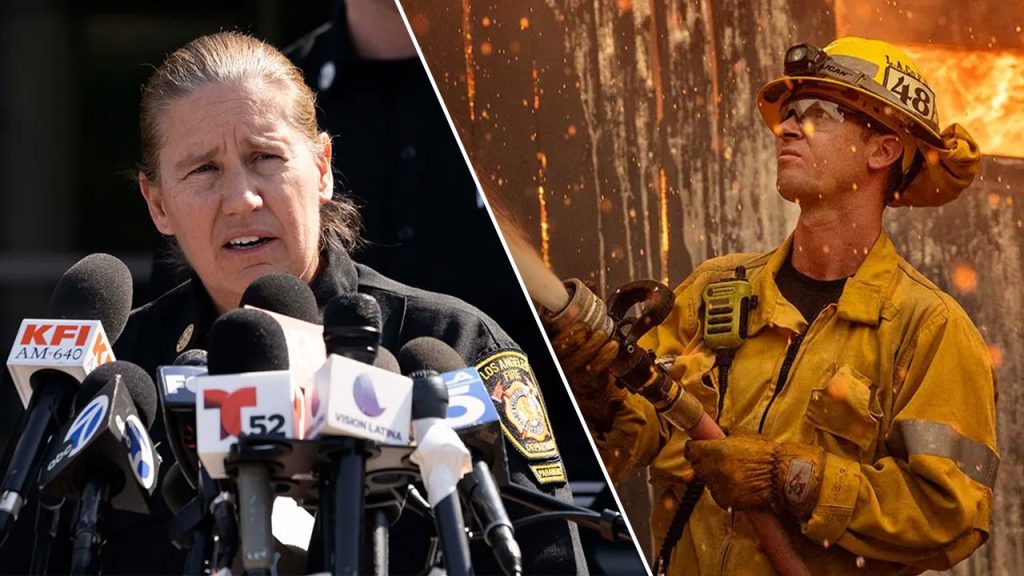Los Angeles Fire Department Chief Kristin Crowley delivered a scathing indictment of the City of Los Angeles’s handling of the recent wildfire crisis, explicitly stating that the city failed its displaced residents. Crowley pointed to crippling staffing shortages and inadequate resources as the primary reasons for the department’s hampered response, directly linking these deficiencies to budget cuts. The chief’s candid assessment highlighted a systemic problem plaguing the department for years, one she claims has been consistently brought to the city’s attention but remains largely unaddressed. Crowley’s public admission of the city’s failure underscored the gravity of the situation and the urgent need for substantial change within the fire department.
Chief Crowley emphasized the direct correlation between budget cuts and the department’s diminished capacity to respond effectively to emergencies. She argued that any reduction in funding inevitably impacts service delivery, either through cutbacks in essential services or significant delays in response times. The chief referenced a $17.5 million budget reduction, highlighting its impact on a department already stretched thin by an ever-increasing call volume. Crowley asserted that the fire department responded to over 1,500 calls and transported 650 patients daily even before the recent wildfire surge, a stark illustration of the immense strain on its resources. This already heavy workload, coupled with budget cuts and staffing shortages, created a perfect storm for a suboptimal response to the wildfire crisis.
Crowley revealed that the department’s struggles are not new, but rather a long-standing issue that has been repeatedly raised with city officials. She cited a series of memos sent to the city detailing the department’s needs, underscoring the chronic understaffing, under-resourcing, and underfunding that has plagued the LAFD for years. The chief pointed to a stark statistic: call volume has doubled since 2010, accompanied by a 55% increase in workload, while the department operates with 68 fewer personnel. This unsustainable situation, Crowley argued, necessitates a substantial increase in funding to equip firefighters with the necessary resources to effectively protect the city. The chief’s insistence that this is not a new problem underscored a perceived lack of responsiveness from city officials to her repeated warnings.
Chief Crowley’s call for increased funding was not merely a plea for more resources but a strategic roadmap for improving the department’s capabilities. She outlined specific needs, including the construction of 62 new fire stations and a doubling of the firefighter force. Crowley argued that these demands are justifiable, based on concrete data illustrating the department’s needs relative to the city’s growth. She pointed out that Los Angeles has doubled in size since 1960, while the number of fire stations has decreased, creating a dangerous imbalance between the city’s expanding needs and the department’s shrinking resources. This disparity, according to Crowley, is at the core of the department’s inability to effectively serve the community.
Crowley’s impassioned plea transcended the realm of budgetary requests, emphasizing the dedication and sacrifice of the city’s firefighters. She distanced the department from politics, portraying its members as public servants committed to protecting the community, often prioritizing this duty above their own well-being and that of their families. Crowley’s assertion that firefighters are not politicians underscored her focus on the practical needs of the department and the well-being of the community, rather than political maneuvering. This emphasis on service and dedication aimed to highlight the urgency of addressing the department’s needs, framing it not as a political issue but as a matter of public safety.
Chief Crowley’s stark assessment of the situation and her impassioned plea for increased funding painted a clear picture of a fire department struggling to keep pace with the demands of a growing city. Her public acknowledgment of the city’s failure to adequately support its firefighters underscored the gravity of the situation, transforming a budgetary discussion into a critical conversation about public safety. Crowley’s directness and transparency signaled a desperate need for change, a call for action aimed at ensuring the LAFD can adequately protect the city and its residents. Her final message was unambiguous: proper funding is not a luxury but a necessity for the safety and well-being of Los Angeles.

